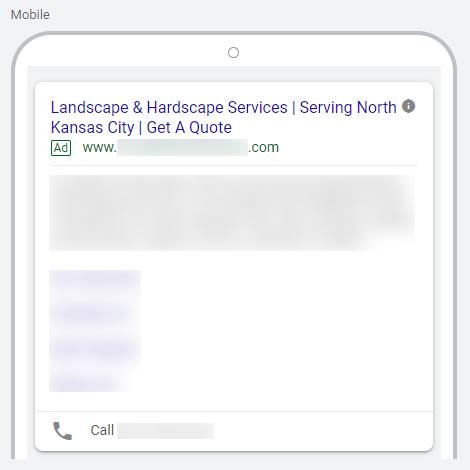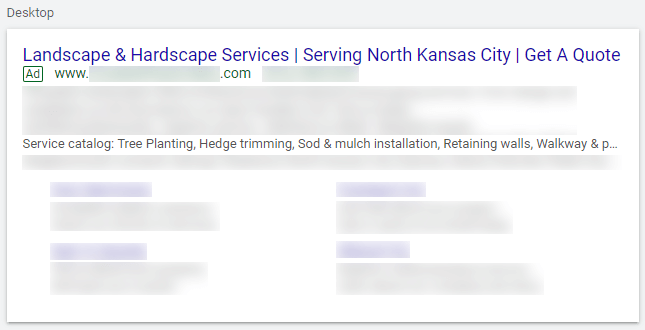A few months back I wrote a blog post saying that we might release an ebook about Google Ads for the landscaping and lawn care industry.
Since then, I’ve realized that I underestimated the urgency to provide something sooner explaining our logic to new clients.
At the time, the idea was to provide a DIY solution for the guys (or their wives) that were still in the early stages of growing their business. Another smaller audience might be other advertising agencies or freelancers looking to build landscaping or lawn care Google Ads campaigns for their clients.
If that’s you, this blog post will still be helpful.
But more than anything else, I want to address some of the most common questions, concerns, and push-backs that we get challenging why we build Google Ads campaigns the way that we build them.
The Difference Between Disruptive and Search-Based Marketing Strategies
If you work within the landscaping and / or lawn care industry, your work is seasonal. Fertilization and mulch installations are big in the spring. Commercial landscaping jobs can last well into summer. Fall clean-ups are obviously big in the fall, and for those willing to brave the cold, snow removal happens in the winter.
With Google search, people search for exactly what they want, when they want it. You don’t have to worry much about promoting the right services at the right times because you can pick those keywords and your ads will show whenever people search for them.
Other advertising strategies are more disruptive — and by disruptive, I mean unexpected.
For example, if you do print mail, that’s unexpected. Sure, people expect mail when they check their mailbox, but they’re most likely not expecting mail from you.
Disruptive advertising requires a certain amount of shock value. Since people aren’t actively looking for your services, it makes sense to give them an enticing offer based on the service you want to promote. That works well. If all you did was mail out a postcard saying “WE DO LANDSCAPING”, you might get a few phone calls, but not as many as offering 20% off their next landscaping project.
My point is, it’s important to match the advertising message to the medium. When it comes to Google search ads, don’t give people what you want to promote; give them what they’re searching for.
Our ads aren’t promotion-heavy. That partly because of our clients. They don’t just want more clients or customers — they want more quality clients or customers. When you put a strong emphasis on promoting cheap work, you get cheap customers. Cheap customers suck.
But the main reason we generally follow the same ad format is that it gives people exactly what they’re searching for.
Headline #1: Service matching the keywords in the ad group
Headline #2: Location
Headline #3: Call to action, branding, offer

Our descriptions may vary and the headline order might change, but this works. We give people what they want, where they want it, and that’s the purpose of Google search. You don’t have to hard-sell people who are searching for you, but make sure that you’re showing up.
Don’t Target Individual Services. Call Them Out.
I just got done saying people use Google to search for what they want, but that’s only partly true.
The best example I can give is the gym.
Let’s say you’re looking to join a gym. You probably have a good idea of what kind of gym you would like to join. Maybe it’s open 24 hours with staff on-site. Maybe it has a lot of open treadmills, or few machines and a lot of free weights.
You might want these things, but you probably don’t search for “local 24 hour gyms with lots of treadmills and free weights”. You most likely search for “gyms in [your city]”, or “fitness center near me”. Even if you don’t, most people do.
The same is true for landscaping and lawn care. I don’t care what any other marketer says — most people don’t search for “chinch bug control services” or “custom patio and fireplace installation services”. They search for “lawn care in [city]” and “landscaping [city]”.
Remember, most people don’t click on ads. Unless your business is grossing over five million annually or servicing half of the state, these keywords might get one click per month. You can’t do anything with that.
Ultimately, people often search for one thing when they mean something else — their intent is implied rather than explicit. So the words you use to label your services aren’t necessarily what people search, but they’re still the services people want.
This means you should target broad keywords that get volume, then promote the individual services people want. I don’t mean that you should target “yard” or “lawn” as keywords. Our keywords are still pretty narrow. But they need to have volume.

We use a lot of ad extensions. One of my favorites is the “service catalog” structured snippet. It allows you to list individual services. This is the perfect opportunity to say a service that people want, but not a lot of people search for (spring and fall clean-ups, for example).
Use Negative Keywords to Exclude Undesirable Customers
When people make their intent clear in how they search, it’s easy to exclude undesirable customers — just use negative keywords.
(For those who might not know, negative keywords are words that you don’t want your ads to show for. In other words, if a negative keyword shows up in the search, you’re saying “don’t show my ad”.)
We have a master negative keyword list that we apply to all of our client accounts. The list covers searches that are always a waste of money. A couple of good examples are “resume” and “rocks”. If people have “resume” in their search, they probably aren’t looking for someone to handle their landscaping or lawn care (they’re probably looking for a job). We also found that people who search for landscaping “rocks” are primarily do-it-yourself-ers — another undesirable customer, if you could even call them a customer at all.

It’s harder to exclude undesirable customers from seeing your ads when their intent isn’t clear. We see this a lot with businesses that have a strong focus on either residential or commercial customers.
The obvious solution is to include either “residential” or “commercial” in your keywords. That’s the best way to make sure the leads you receive are the right kind. The problem is that people rarely make that intent clear when searching. They want a landscaper. They don’t know the jobs require different tools and resources, so they just search for landscaping companies in their city. If your keywords are too specific, you’ll miss out on good leads.
Adding the group you don’t serve as a negative keyword ensures you aren’t paying for clearly irrelevant leads. This is the more realistic route for small businesses because if your keywords get too specific, you won’t spend any money on ads at all.
That’s not always a bad thing. It depends on your business, which is why we handle it market by market. But it’s a good thing to think about, and one that many never do.
I could go on, but since time is money, our time is better spent managing our clients accounts. I’ll keep chipping away at this concept in our downtime though. If you have questions, let us know.


0 Comments